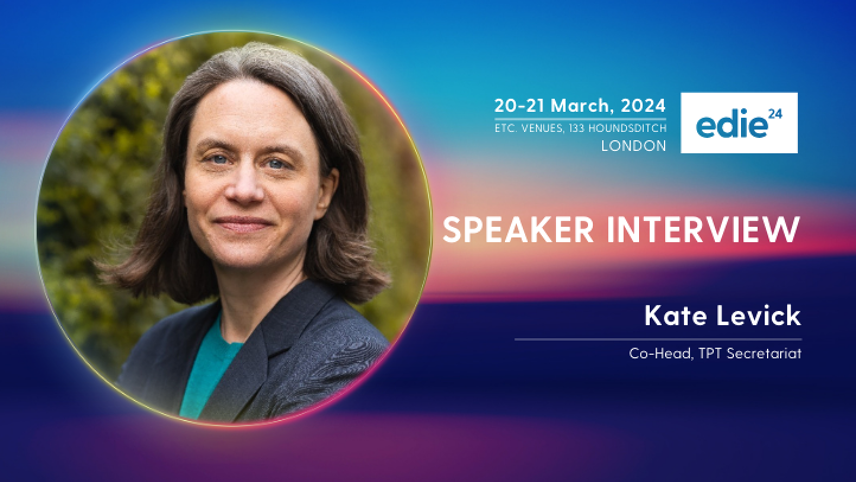Register for free and continue reading
Join our growing army of changemakers and get unlimited access to our premium content

In a bid to align strategic planning at large companies with its legally binding net-zero target, the UK Government commissioned the creation of a Transition Plan Taskforce (TPT) – a body to determine what a credible corporate transition plan for climate should look like – in 2021.
Last October, the jewel in the crown of the TPT’s work, its pan-industry ‘gold standard’ framework, was published. Levick tells edie that more than 100 organisations were involved in writing this, which a further 500+ responded to consultations on the standard.
“I think there’s a strong sense of ownership, rather than organisations just being recipients of the final work, and we’re really proud of that,” she says.
The gold standard outlines how businesses can turn targets into meaningful changes to strategic planning. It covers factors such as climate risk management, technology and infrastructure investments, changing business models, plus upskilling and reskilling staff.
Many of these facets are not included in existing British corporate climate targets, which are increasingly verified as science-based but rarely backed with publicly available delivery plans that include facets such as fully-costed investment strategies.
Building on the gold standard, which Levick describes as the “central output” of the Taskforce’s two-year workstreams, the organisation recently consulted on sector-specific guidance.
The gold standard already included, in brief, guidance for 40 different industries. The new consultations intend to provide “more of a deep dive” for seven sectors, explains Levick – namely asset management; asset ownership; banking; food and beverages; metals and mining; electric utilities and power generation, and oil and gas.
These sectors were chosen due to their potential for leveraging the net-zero transition across the UK and in their international value chains. Energy is estimated to account for more than three-quarters of the world’s annual emissions while land use accounts for most of the remainder.
The TPT aims to have comments from the consultations on the sector-specific, in-depth guidance “integrated” into a “finalised” tool by mid-2024. This is when its workstreams are due to wrap up.
International interoperability
Upon promising the TPT in late 2021, then-Chancellor Rishi Sunak stated an intention for disclosures to be mandatory by the end of 2023. A mandate has not been delivered to this timescale amid the fallout of the Covid-19 pandemic, but, for Levick, this is not a significant concern.
The Financial Conduct Authority (FCA) has already asked large businesses to have regard of the TPT’s outputs – especially those firms already subjected to mandatory disclosures aligned with the Taskforce on Climate-Related Financial Disclosures (TCFD).
FCA-led consultations on stronger messaging are due to be conducted this year. Changes would come into force in 2025 at the earliest.
The UK is not the only country developing transition plan recommendations or mandates; Levick said she saw the topic “discussed in many places” at COP28 and has more broadly observed the “international conversation moving at a pace”.
“We wanted to help the UK to shape that international conversation… The UK is a leader, but the EU has, in parallel, also been setting out expectations,” she states, pointing to the EU’s recent decision to embed transition planning requirements in its Corporate Sustainability Due Diligence Directive (CSDDD).
Other international leaders in Levick’s opinion include Australia and Singapore.
Asked whether sustainability professionals should be concerned about jumping through hoops to comply with the the veritable wave of forthcoming mandatory and voluntary disclosure, she elaborated: “Fundamentally, we are moving towards convergence on sustainability disclosures internationally. We see the International Sustainability Standards Board (ISSB) as the global baseline, with many countries expected to adopt that. So we’ve built on that very strongly.
“The goal in the end is to support the creation of consistent, comparable company reports and to reduce the level of complexity faced by firms. All of these different expectations should start to become very compatible.”
Beyond compliance
Levick also discusses how many businesses which have already begun transition planning and, indeed, planning for other upcoming sustainability-related disclosures, swiftly stop seeing them as ‘tick-box’ exercises which eat into valuable time.
Instead, transition planning should facilitate new and difficult discussions which result in meaningful, potentially significant changes to core business strategy. These discussions should involve departments including finance, legal, innovation, operations, human resources and more rather than being siloed to sustainability.
Levick explains: “Disclosing a transition plan is the end of a process within a company… There are huge numbers of benefit to [this process]; it’s very much not just about compliance. If transition planning was purely a compliance activity, I think there would have been no point.
“The underlying goal here is to transition the whole economy to net-zero and to change the way that firms do their business.”
HEAR FROM THE TPT AT EDIE 24
The co-head of the UK’s Transition Plan Taskforce secretariat, Kate Levick, is delivering a keynote speech on accelerating momentum on corporate transition plans at edie 24 on 20 March.
edie 24 is the brand’s largest face-to-face event of the year and will convene hundreds of sustainability and energy leaders in central London on 20-21 March 2024 for two monumental days of keynote speeches, panel debates, unparallelled networking opportunities, interactive workshops and more.
Experts speaking alongside Levick on this year’s packed agenda include:
- Chris Packham, renowned naturalist and presenter
- Chris Skidmore MP, author of the Net-Zero Review
- Claire O’Neill, chair of the WBCSD and former UK Minister for Business, Energy & Industrial Strategy
- Chris Stark, CEO of the Climate Change Committee
- Rachel Solomon Williams, executive director of the Aldersgate Group
- Natalie Belu, co-CEO of Belu and independent candidate for London’s Mayoral Elections
Tickets for the event are available now on an individual, group and sharing basis, with a full price list available here.
With places limited, edie users are encouraged to book edie 24 tickets now. You can secure your place here.


Please login or Register to leave a comment.